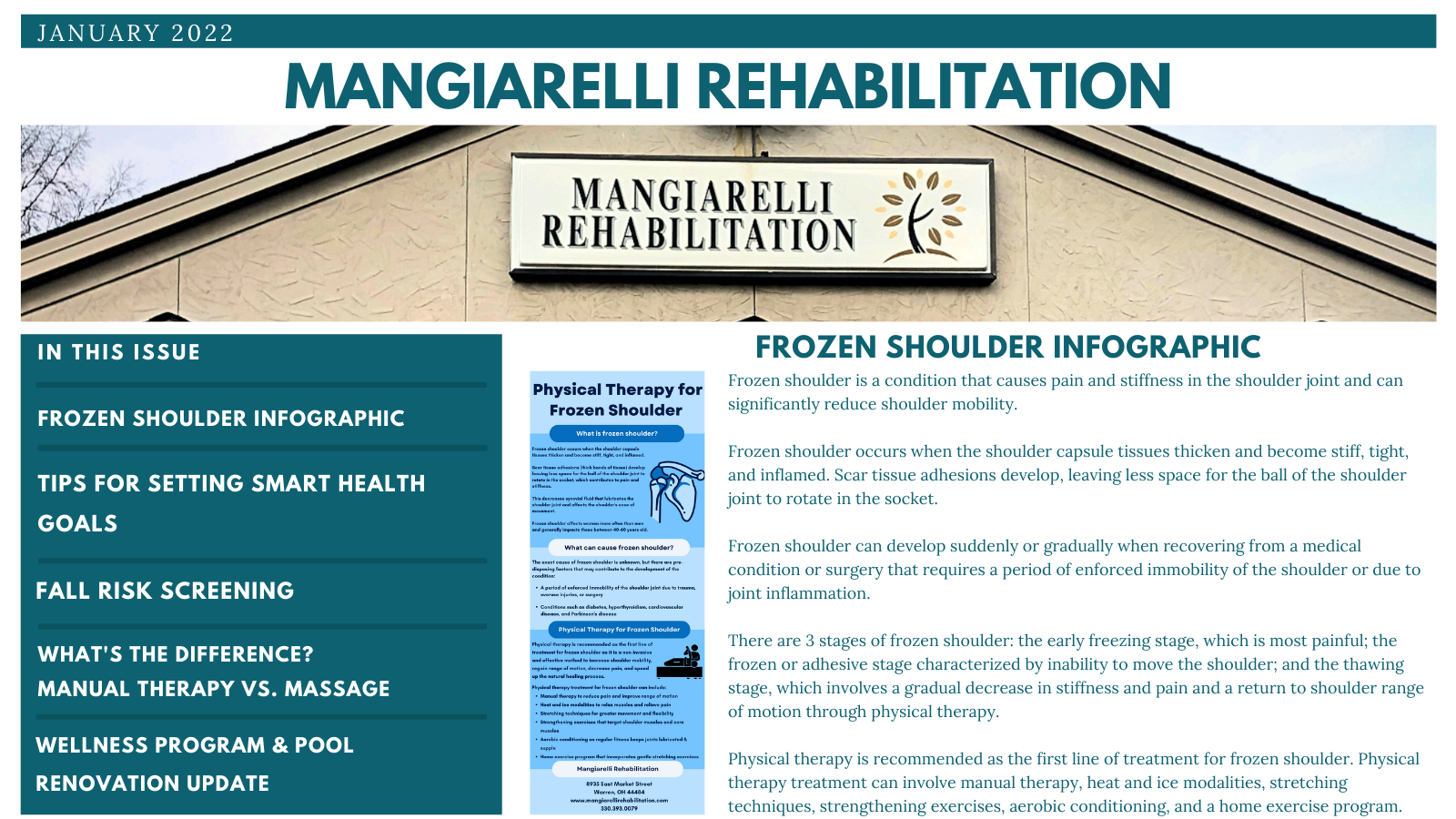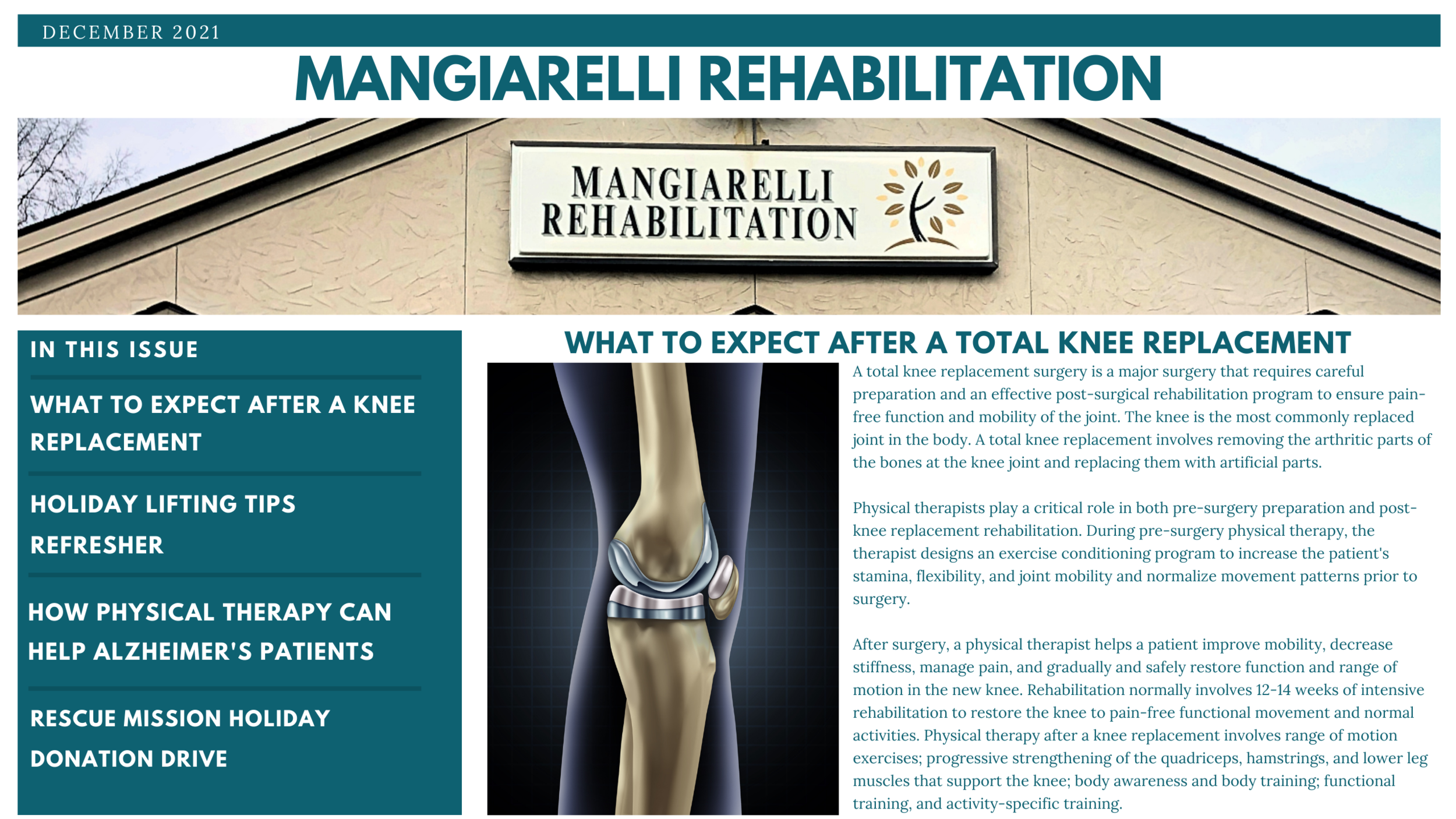Mangiarelli Rehabilitation Physical Therapy Blog
Physical Therapy After Covid: Addressing Post-Covid Syndrome
Have you recently had COVID and are recovering? Are you feeling physically deconditioned or experiencing generalized weakness and muscle fatigue after Covid? You may be experienced Post-Covid Syndrome, or “Long Covid.” Post-Covid Syndrome refers to lingering physical symptoms that you can experience after acute Covid infection that limit your function and independence. Physical therapists play a critical role in helping you recover from the long-term effects of Covid, regain function, strength, and mobility, and return to daily activities confidently.
Physical Therapy for Osteoarthritis of the Spine
Osteoarthritis is the most common type of arthritis affecting the spine, often due to age-related wear and tear and mechanical changes in the spinal discs. Spinal osteoarthritis leads to pain in the back and neck and stiffness and loss of mobility in the spine. Physical therapy can help to reduce spinal osteoarthritis symptoms, slow progression of the disease, and instruct patients how to safely exercise.
Physical Therapy for Sciatica Pain [Infographic]
Check out our infographic on physical therapy for sciatica pain! Physical therapy is the most effective treatment for sciatica pain. Sciatica is nerve pain that originates in the low back and radiates down the length of the leg due to irritation or compression of the sciatic nerve. Physical therapists treat sciatica pain through targeted strengthening of the low back, hips, and gluteal muscles, a progressive exercise program, manual therapy, and aquatic therapy.
Tips to Improve Your Swim Stroke and Avoid Injury
Swimming is a low-impact full-body workout that improves muscle strength and tone and cardiovascular fitness with minimal weight-bearing stress on your joints. However, the shoulder is particularly vulnerable to injury due to the repetitive nature of the swim stroke. It is essential to maintain correct biomechanics and proper technique throughout the swim stroke to reduce the risk of a shoulder injury. Check out our tips to improve your swim stroke and avoid injury with physical therapy!
Fixing Tech Neck with Physical Therapy
Tech neck is a repetitive stress injury to the neck caused by prolonged use of technology in which the head is bent downward, straining the muscles of the neck, shoulders, and upper back. Bending the neck forward when using technology places an excessive load on the neck, leading to pain, tightness, and limited range of motion. Physical therapists address tech neck through a customized stretching and strengthening exercise program, manual therapy, and posture reeducation.
Winter Sports Concussion Treatment
January is National Winter Sports Traumatic Brain Injury (TBI) Month. Winter sports are played with high velocity and impact potential on the hard surfaces of snow and ice, which can lead to injury. Winter sports account for over 23,500 concussions in the United States each year. It is essential to take proper precautions to protect winter sports athletes and prevent concussions. Should a concussion occur, proper medical care is critical; physical therapists play an important role in winter sports-related concussion management and treatment.
January 2022 Newsletter
Check out our January 2022 Newsletter with updates including tips for setting health goals, a frozen shoulder infographic, fall risk screening, what’s the difference between manual therapy and massage, and a wellness program and pool renovations update.
What’s the Difference between Manual Therapy and Massage Therapy?
What is the difference between manual therapy and massage therapy? Often manual therapy and massage are used interchangeably despite the fact that there are fundamental differences. Physical therapists provide manual therapy, which is a hands-on treatment technique to regain movement, activate muscles, and reduce pain and inflammation. Manual therapy includes soft tissue and joint mobilizations, myofascial release, muscle energy techniques, manual traction, cupping, dry needling, lymphedema, thrust manipulation, and strain-counter-strain techniques.
Tips for Setting Smart Health Goals
As we prepare to enter the new year, it’s the perfect time to set realistic goals for a healthier, happier 2022 using the SMART goal-setting framework. Too often, we set undefined and unsustainable resolutions that die out by February. Instead, we propose crafting a plan of smaller steps to achieve goals that are specific, measurable, attainable, relevant, and time-bound. Check out our breakdown of how to build a SMART goal and our 8 suggestions for 2022 health resolutions!
Physical Therapy for Piriformis Syndrome
Piriformis pain syndrome can develop due to tightening of the piriformis muscle, which can irritate or compress your sciatic nerve causing significant pain in the buttocks, hip, lower back, and back of the leg. The piriformis muscle is a flat, band-like muscle located in the buttocks directly above the sciatic nerve that stabilizes the hip joint and enables lower extremity movement. Physical therapists can relieve piriformis syndrome pain and restore normal movement and range of motion in the affected area through targeted strengthening exercises, manual therapy, and movement reeducation.
10 Holiday Health and Fitness Tips
The holiday season is in full swing with holiday parties, work events, last-minute shopping, and cross-country traveling. It can be tempting to abandon your healthy habits with the highly palatable comfort foods of the season, the hectic pace, and the cold weather. Check out our 10 tips to stay healthy and fit over the holidays while thoroughly enjoying all the holiday season has to offer!
What to Expect After a Total Hip Replacement
A total hip replacement surgery is a common orthopedic surgery performed due to arthritis or certain hip fractures to relieve severe pain, improve hip mobility, and restore function. A hip replacement involves removing damaged bone and cartilage from the hip joint and replacing it with prosthetic parts. Physical therapists play an important role in pre-surgery preparation and post-hip replacement rehabilitation, helping to improve mobility, manage pain, regain strength, and restore function in your new hip.
10 Tips for Exercising in the Cold
In Northeast Ohio, the winter months can bring frigid temperatures, ice, and snowy weather. However, the colder weather doesn’t mean that those outdoor activities are canceled. Whether you’re an athlete, a runner, an outdoors lover, or just need a break from the inside, you can still exercise outdoors safely by following these 10 tips!
Frozen Shoulder Infographic
Frozen shoulder is a condition that causes pain and stiffness in the shoulder joint and can significantly reduce shoulder mobility. Frozen shoulder occurs when the shoulder capsule tissues thicken and become stiff, tight, and inflamed. This can occur after surgery due to enforced immobility of the shoulder, trauma to the joint, or joint inflammation. Physical therapy is recommended as the first line of treatment for frozen shoulder to increase shoulder mobility and regain range of motion. Check out our infographic to learn more!
Physical Therapy for Neck Pain
Neck pain is one of the most common musculoskeletal conditions, affecting 30 to 50% of adults each year. While there can be numerous causes of neck pain, the most common source of neck pain is mechanical neck pain resulting from muscle strain or joint issues. Physical therapy is the most effective treatment for neck pain, reducing pain and stiffness, improving range of motion, and strengthening the postural flexibility of the neck through therapeutic exercise and manual therapy.
December 2021 Newsletter
Our December 2021 Newsletter highlights what to expect after a knee replacement, holiday lifting tips refresher, how physical therapy can help Alzheimer’s patients, and how to participate in the rescue mission holiday donation drive.
Physical Therapy for Ballet Injuries
Ballet is a full-body art form that demands precise technique with incredible muscular strength and stamina and extreme flexibility and range of motion. Ballet dancers engage in long hours of training and performance involving repetitive movements that contribute to injuries, particularly in the ankle, foot, leg, hip, and low back. Physical therapists can provide ballet dancers with specialized and customized treatment to help dancers fully recover from injury and effectively restore range of motion, strength, function, and motor control in order to safely return to performance with endurance and power.
Holiday Lifting Refresher and Safety Tips
Mangiarelli Rehabilitation physical therapy assistant, Patti, demonstrates how to lift an object correctly and safely as well as several common but incorrect and unsafe ways to lift. The holiday season requires quite a lot of bending, lifting, and reaching. If you lift improperly, it can lead to back, shoulder, or neck strain and limit your holiday activities. As we enter the holiday season, it’s critical to review how to lift heavy objects safely and take steps to minimize strain and fatigue during your winter and holiday activities.
Physical Therapy for Rheumatoid Arthritis
Rheumatoid arthritis is a systemic autoimmune disease that affects the soft tissues around joints, causing joint inflammation and pain and limiting joint function. Early detection of the condition and treatment is key, which includes drug therapies and targeted exercise. Physical therapists help rheumatoid arthritis patients manage pain and improve muscle strength and joint function and range of motion through a therapeutic aerobic and strengthening exercise program.
How Physical Therapy Can Help Alzheimer’s Disease Patients
In honor of National Alzheimer’s Disease Awareness Month, we are explaining how physical therapy and therapeutic exercise can help improve symptoms of Alzheimer’s disease and slow the progression of the condition. Exercise improves cognitive functioning, helps Alzheimer’s patients stay mobile and functional as long as possible, and improves overall quality of life. Check out our infographic to learn more!


![Physical Therapy for Sciatica Pain [Infographic]](https://images.squarespace-cdn.com/content/v1/5e419cdc97af032560004b99/1642433186988-YGFA0QQANLFLM1BD3D0Y/Blog+PT+Sciatica+.png)




























